

The COVID-19 pandemic exacerbates the pressures faced by women caregivers. Coronavirus lockdown is a dangerous time for victims of domestic abuse – here's what you need to know. Emphasis is currently being placed on people to self-isolate from their places of work and leisure, posing the home as a place of relative safety during the coronavirus pandemic.

However, there is growing concern about what impact this might have on those trapped in intimate relationships with people who use violence and abuse. Isolation could improve how we think about and navigate sex and relationships. The coronavirus pandemic has already profoundly changed many of our lives.
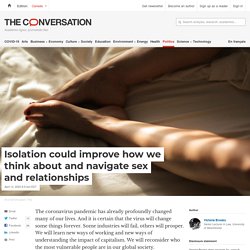
And it is certain that the virus will change some things forever. Some industries will fail, others will prosper. We will learn new ways of working and new ways of understanding the impact of capitalism. Lockdown 'funnelling': how the pandemic has changed our relationships. The coronavirus lockdown has been a unique social experience that has had significant effects on our social relationships.
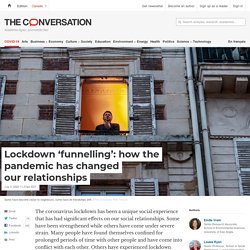
Coronavirus isolation is creating new couples - BBC Worklife. ‘We missed our moment’ Mathilde Laluque, 31, Paris, France Wedding dress maker Matilde Laluque and her 29-year-old boyfriend had enjoyed a romantic six weeks exploring Parisian galleries and restaurants after meeting on Tinder in mid-January.
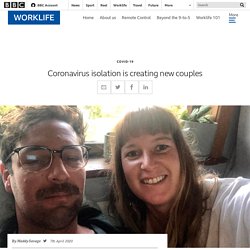
But the couple opted to navigate the French capital’s lockdown while living apart. Virtual Dating Is the New Normal. Will It Work? How neoliberalism colonised feminism – and what you can do about it. All of a sudden, everyone wants to claim the feminist label.
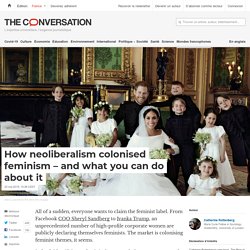
From Facebook COO Sheryl Sandberg to Ivanka Trump, an unprecedented number of high-profile corporate women are publicly declaring themselves feminists. The market is colonising feminist themes, it seems. Unemployment pushes more men to take on female-dominated jobs. In the last few decades, many high-paying jobs that are mostly done by men – like manufacturing – have contracted or disappeared.
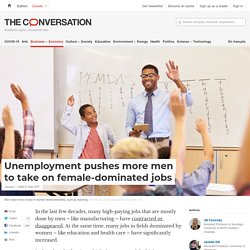
At the same time, many jobs in fields dominated by women – like education and health care – have significantly increased. In fact, female-dominated jobs have some of the highest projected job and wage growth in the economy. We are sociologists interested in the following question: If jobs in female-dominated sectors represent the future, what will it take for men to take them? Tradwives: the women looking for a simpler past but grounded in the neoliberal present. Alena Petitt, a well-known author and lifestyle blogger, has become the British face of the “Tradwife” movement, closely associated with the hashtag #TradWife.
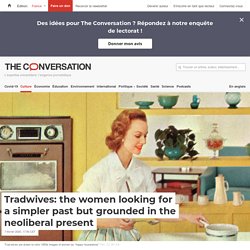
The movement harks back to an earlier era, encouraging women to take pleasure in traditional domestic duties while promoting feminine submissiveness, domesticity, and wifehood. In a BBC clip, Petitt explains that her role is to submit to, serve, and spoil her husband “like it’s 1959”. Writing on her website, The Darling Academy, she adds that many women crave a “sense of belonging and home and quaintness,” and therefore choose to become homemakers where “husbands must always come first”. Given its glorification of traditional femininity, the Tradwife movement is often framed in the media as a backlash against feminism. This can been seen in news stories featuring bitter disagreements between feminist critics and women who embrace a tradwife identity. Asian guys stereotyped and excluded in online dating. This Valentine’s Day, many single people will be looking for their date online.
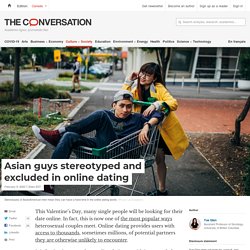
In fact, this is now one of the most popular ways heterosexual couples meet. Online dating provides users with access to thousands, sometimes millions, of potential partners they are otherwise unlikely to encounter. Love is good for us, so why do lawmakers try to break us up? Research in medicine, psychology and neuroscience demonstrates the powerful effects of love on our physical and mental health.
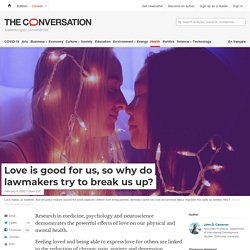
Feeling loved and being able to express love for others are linked to the reduction of chronic pain, anxiety and depression, improved functioning of the immune system, reduced risk of cancer, improved cardiovascular health, increased life expectancy and feelings of positive self-esteem, happiness and general well-being. A multi-decade Harvard study found positive links between perceptions of being loved during childhood and reduced incidence of multiple diseases associated with middle age. Research using data from the Canadian National Population Health Survey found that perceptions of being loved had a greater positive impact on human health than the negative impacts of daily smoking. The negative impact of a loveless life Extensive research also highlights very serious negative effects of not being loved, particularly for children.
Birds, bees and bytes: How tech is changing sex. Sex in space: Could technology meet astronauts' intimate needs? The 2018 movie A.I.
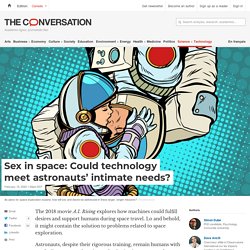
Rising explores how machines could fulfill desires and support humans during space travel. Lo and behold, it might contain the solution to problems related to space exploration. Astronauts, despite their rigorous training, remain humans with needs. For space exploration and colonization to succeed, we need to overcome taboos, consider human needs and desires and provide concrete, realistic solutions based on science rather than conventional morality. Marriage Has Become a Trophy. Matt Benoit / goir / timurockart / Nerthuz / Manon_Labe / Shutterstock / Arsh Raziuddin / The Atlantic The decline of marriage is upon us. Or, at least, that’s what the zeitgeist would have us believe. In 2010, when Time magazine and the Pew Research Center famously asked Americans whether they thought marriage was becoming obsolete, 39 percent said yes.
That was up from 28 percent when Time asked the question in 1978. Does “Love” Mean the Same Thing in Every Language? The smelly truth about romantic relationships and health. Having trouble sleeping? Nervous about an important interview? - The Washington Post. - The Washington Post. - The Washington Post.